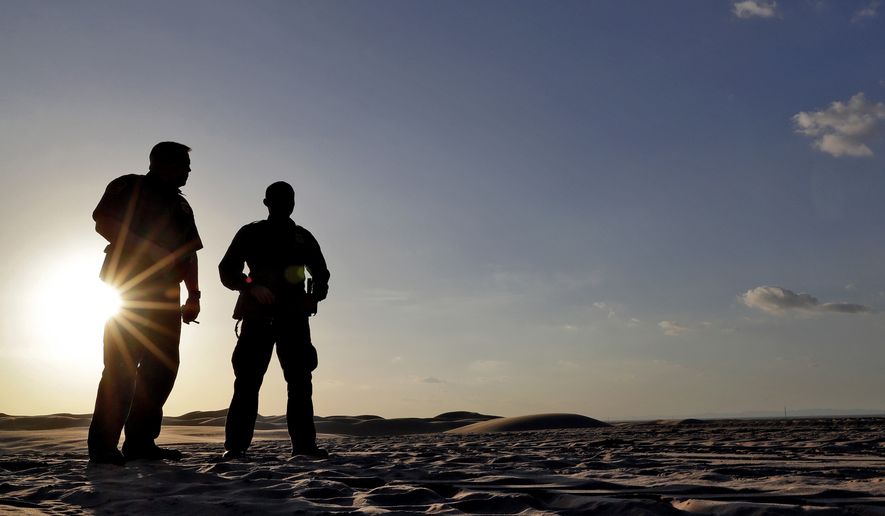Pregnant immigrants caught trying to cross the border illegally can leave the U.S. rather than force the federal government to facilitate an abortion, the Trump administration argued to a federal appeals court Wednesday.
But the American Civil Liberties Union, and at least one of the three judges on the panel hearing the cases, seemed skeptical, saying immigrants appear to have a right to abortion, and it’s unfair to give them a choice of either continuing their pregnancy against their wishes or accepting deportation.
The case is testing the limits of abortion and immigration law — and even invokes Supreme Court nominee Judge Brett M. Kavanaugh, who ruled in an earlier iteration of the case, though his decision was later overturned by his colleagues on the U.S. Circuit Court of Appeals for the District of Columbia.
At issue are perhaps dozens of immigrant teens who attempted to sneak into the U.S. illegally and unaccompanied by their parents, and who are now in custody of the Health and Human Services Department’s Office of Refugee Resettlement.
The government says it’s searching for sponsors to take the children, but in the meantime, it is acting instead of their parents, has an interest in helping the teens make the best choices possible regarding abortion and has a general policy against facilitating the procedure.
A lower court ruled against the Trump administration, certifying a class action for all pregnant immigrant juveniles in government custody and ordering they be granted unfettered rights to abortion.
“This is an unprecedented expansion of abortion jurisprudence,” August Flentje, arguing the case for the Justice Department, told the three-judge panel.
The administration is asking the appeals court to cancel the judge’s class certification and to curtail her broad order applying to every immigrant teen in ORR custody — including the vast majority the government said aren’t seeking abortions.
Some conservatives have warned that Judge Tanya S. Chutkan’s ruling turns the U.S. into an abortion “sanctuary,” giving immigrants from places where abortion is outlawed an incentive to attempt to illegally enter the U.S., knowing that the government will have to facilitate their decision.
The panel of judges pressed the government on the burden it is imposing on the immigrant teens by denying them speedy abortions.
Mr. Flentje countered that the teens always have control over the situation.
“The government is not imposing a burden. The child can leave custody by going back,” he said.
He said that takes the government out of the equation.
Judge Sri Srinivasan, though, said abortion is a right the teen has, and going back to their home country strips them of that right they gained once entering the U.S.
“If you leave the country, the right is gone,” he said.
For its part, the ACLU argued Judge Chutkan got it right in issuing a broad ban on the government interfering in any way with pregnant immigrant teens who entered the U.S. illegally.
“The defendants in this case basically stopped at nothing to prevent unaccompanied minors accessing abortion,” said Brigitte Amiri, the ACLU’s lawyer.
An earlier iteration of the case came before the circuit court late last year when it involved a specific immigrant who was in the U.S. illegally and whom the government was refusing to help transport to get an abortion, even though she had arranged private funds.
The government at that point argued federal law prohibited it from spending any money to facilitate the procedure, and that included transportation and staffing costs.
Judge Kavanaugh was part of a three-judge panel that ruled for the government, arguing ORR should be given more time to find a sponsor to take custody of the child. He said Judge Chutkan’s ruling amounted to “immediate abortion on demand” — which he said went beyond the rights the Supreme Court established in the Roe v. Wade and Casey v. Planned Parenthood rulings.
His involvement in that earlier iteration could cause him to recuse himself should he be confirmed to the Supreme Court and the case reach the justices again.
Judge Laurence Silberman alluded to that Wednesday, wondering if that was one reason why the ACLU didn’t go back and find a new case with more current plaintiffs that could avoid some problems with the ACLU’s class action claims.
“If it were a new case, it wouldn’t raise a recusal issue for a potential Supreme Court justice,” Judge Silberman said.
• Stephen Dinan can be reached at sdinan@washingtontimes.com.




Please read our comment policy before commenting.